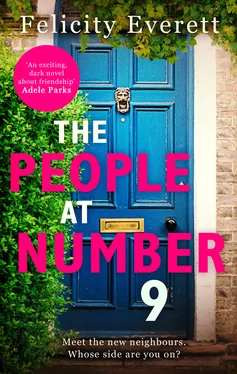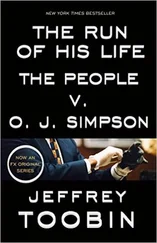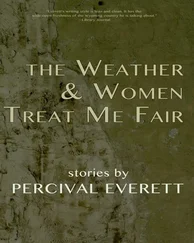“Kitchen?”
They blinked as they entered the strip-lit room. It was as busy and vibrant as the living room had been underpopulated and dull. The decibel level alone was intimidating, and for a moment, confronted by what seemed to be an impenetrable wall of bonhomie, Sara’s instinct was to run. These people were not locals – they looked as though they had been flown in from an avant-garde New York gallery. Here were septuagenarians in skinny jeans and twenty-somethings in tweed. Here were Baader Meinhof intellectuals, kohl-eyed It girls, preening dandies and scrofulous punks. Sara felt instinctively for her husband’s hand and steered a course through the mêlée, until she reached safe harbour beside the kitchen table. Neil went to put the Moët down, but Sara gave him a warning look.
There had been no attempt to prettify the kitchen, or create atmosphere. It was just a watering hole and looked, as far as Sara could remember, exactly as it had when the house had gone up for auction. Perhaps Lou and Gavin had spent all their money converting the basement, or perhaps, seventies retro being back in fashion, they considered its brown floral tiles and yellow melamine cupboards a stylistic coup.
“Ooh, champagne! Crack it open then.”
“Carol, hi!” Sara was a little surprised, herself, at the grudging tone of her own greeting. Carol was wearing one of her Boden wrap dresses, accessorised with earrings, tights and nail varnish in the precise jade green of every third zigzag. Her short ginger hair had been freshly coiffed. She looked like a home-economics teacher who had wandered into a seedy jazz club and – unworthy impulse – Sara did not want to be seen with her. Not that Carol wasn’t a great girl, she was. She was stalwart and practical, clever and kind. She was as good for a heart-to-heart as she was for a cup of couscous. There had been confessions over the years and there had been tears. Carol ran a mean book group and threw a decent dinner party and if the guest lists for both tended to overlap, and the conversations repeat themselves, her hospitality was never less than generous. She was, however, no Bohemian.
Even now, as Sara reluctantly filled Carol’s glass with champagne, Carol was assessing the fixtures and fittings.
“Do you think this kitchen’s retro, or just old?”
“I don’t really know,” said Sara. She was trying to eavesdrop on a nearby conversation about rap music and misogyny, but with Carol prattling in one ear and Neil and Simon talking football in the other, it was impossible.
“I thought it’d be state of the art,” Carol went on. “Fancy having the builders in all this time and the kitchen still looking like this.”
“They’ve been making a studio, Carol.”
“Oh yes, I forgot he’s an artist .” Carol widened her eyes satirically and then returned her gaze to the sea of much-pierced humanity surrounding her.
“Do you know any of these people?” she asked. Sara shook her head. The thing was, though, that she wanted to know them, and if Carol stuck to her like glue, that wasn’t going to happen. The crowd was starting to thin a bit now, as guests topped up their drinks and wandered out to the garden. Carol leaned in to make some fresh observation.
“Hold that thought,” Sara said, laying an apologetic hand on her friend’s arm, “I’m busting for the loo.”
Walking down the steps to the garden, she could at last make sense of the intensive tree pruning that had gone on earlier. A gazebo had been erected at the far end, which had been filled with cushions and kilims. Paper lanterns winked with promise from within. You had to take your hat off to Lou and Gavin; they knew how to create a sense of occasion. She supposed it was some sort of chill-out zone and wondered what might take place there as the evening wore on. There would be more pot, certainly, but would there be other drugs? She wondered what she would do if someone offered her cocaine – turn it down, she supposed. There were the kids, for one thing and besides, she’d only do it wrong and look an idiot.
There was still no sign of the hosts, but clusters of people were milling about on the grass, drinking, smoking, weaving their heads, serpent-like, to trip-hop. Most of them seemed to know each other. This must be how it felt to be a ghost, Sara thought, as she floated from one huddle of people to the next, hovering on the periphery, smiling hopefully, yet never quite plucking up the courage to introduce herself. A few guests made eye contact, one or two smiled back and shuffled aside to accommodate her, but their conversations were too bright and smooth and fluent to allow her an entrée – it was like trying to wade into a fast-flowing stream. It was a relief, then, to bump into an acquaintance from a few streets away, who, it turned out, had done an art foundation course with Lou, but who now wanted to talk school catchment areas. After twenty minutes nodding and smiling, shifting her weight from foot to foot, and twirling the stem of her glass, Sara had had enough. She made her excuses and was threading her way back through the throng towards the house, when she met the host coming down the steps.
“Top up?” he said, tilting a bottle of wine towards her glass.
“Thanks,” she said. “You’re Gavin, aren’t you?”
“Guilty as charged.”
He filled her glass and started to move off again.
“We’re neighbours, by the way,” she added, quickly.
“Ahhh,” he said, turning back and re-engaging with genuine interest, “you must be Sara .”
3
Gavin apologised for taking so long to be neighbourly and explained that he had been like a dog, circling round and round in his basket, except in his case, his basket was his studio and it had had to be “not so much hewn from the living rock, as dug out of the London clay.’’ He nodded in the direction of the basement, which was still cordoned off with blue tarpaulins. At close quarters, Sara was relieved to discover he was only moderately handsome. One eyelid drooped fractionally, making him look faintly disreputable, and an otherwise fine profile was marred by a slight overbite. He spoke with a Lancastrian burr, which made everything he said sound vaguely sardonic, and prompted a certain archness in Sara’s response. She didn’t believe, she told him now, that the basement-conversion was a studio at all, but one of those underground gymnasia, beloved of Chelsea oligarchs. He said he’d happily prove her wrong, but not tonight, because he didn’t want just anyone – jerking his head towards his increasingly unruly party guests – traipsing through. At this whisper of a compliment, Sara felt a flutter of excitement in her belly.
“So what is it you do, Sara?” he asked after a pause.
“I’m a copywriter,” she said.
“Great! Advertising. Must be fun.”
“Oh it’s not Saatchi’s or anything,” she said quickly, “it’s really boring. Just in-house stuff for companies mainly. And consumer-y bits…”
He nodded, and turned his head, scanning the garden for someone more interesting to talk to, she assumed.
“… But I write,” she added quickly, “just for myself, you know.”
“Cool,” he said, turning back to her. “What sort of thing?”
“Short stories, the odd poem. I’ve started a novel, but it’s run out of steam.”
“You should talk to Lou.”
“Oh?” said Sara warily.
“Yeah,” he replied, nodding, “she’ll give you a few pointers – depending on the kind of thing it is, of course.”
“Lou’s a writer?”
“A writer-director.”
“What, films? ”
“Yeah. She’s working on a short at the moment. Terrific concept.”
“She never said…”
“Oh, she wouldn’t. She’s very humble, my wife. One of those quiet types that just beavers away in the background and then comes up with this gob-smackingly amazing thing. Know what I mean?”
Читать дальше












